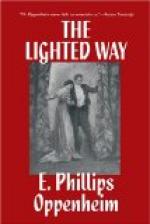Sabatini nodded.
“So you have been successful,” he remarked, thoughtfully. “You kept your feet along the narrow way and you have done well. I am glad. Sit down here by my side.”
Arnold sat down on the end of the sofa. The curtain was pulled up as far as it would go. Below them, the curving arc of lights stretched away to the dim distance. Sabatini followed them with his eyes, for a moment, as though he, too, found something inspiring in that lighted way. Then he turned to Arnold with a queer little twinkle in his eyes.
“By the bye,” he asked, “you haven’t heard—Fenella hasn’t told you of the last turn in fortune’s wheel?”
“I have seen little of Mrs. Weatherley lately,” Arnold murmured.
Sabatini leaned back in his place. His hollow eyes were lit now with laughter, his mouth twitched. The marks of his illness seemed almost to pass.
“It is delicious,” he declared. “Listen. You remember that one day when you dined with me I told you of my uncle the Cardinal?”
“The uncle from whom you borrowed money?” Arnold remarked, dryly.
“Precisely,” Sabatini agreed; “I borrowed money from him! It was only a trifle but I chose my own methods. Heavens, but it is droll!”
Sabatini began to laugh softly. His whole face now was alight with enjoyment.
“Last month,” he continued, “His Eminence died. He had fourteen nephews, three brothers, two sisters, and no end of nieces. To whom do you think he has left his entire fortune, my dear Arnold—three hundred thousand pounds they say it is?”
“To you!” Arnold gasped.
“To me, indeed,” Sabatini assented. “I did not even go to the funeral. I read of his death in the newspapers and I shrugged my shoulders. It was nothing to me. Yet those fourteen nephews were left not so much as would buy their mourning clothes. This is the chief sentence in the will,—’To the only one of my relatives whose method of seeking my favors has really appealed to me, I leave the whole of my fortune, without partition or reserve.’—And then my name. I was that one. Almost,” Sabatini concluded, with a little sigh, “I am sorry that he is dead. I should have liked once more to have shaken him by the hand.”
Arnold was speechless. The realization of what it all meant was beginning to dawn upon him. Sabatini was wealthy—Ruth was a great heiress. Her treasure ship had come in, indeed—and his was passing him by.
“I am glad,” he said slowly, “glad for your sake and for Ruth’s.”
Sabatini nodded.
“My shadowy means,” he remarked, “have kept me in comfort. Perhaps, even, they have been a trifle more than I have let people imagine. Still, this is all very different. Ruth and I are going to wander about the Riviera for a time. Afterwards, we are going to sail to Sabatini and patch up my old castle. I have some tenants there who certainly deserve a little consideration from me—old




